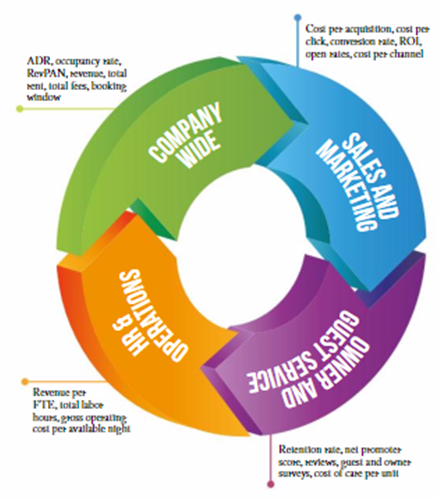“Business Intelligence” (BI) is an umbrella term that includes all the applications, infrastructure, tools, and best practices that enable vacation rental managers (VRMs) to access and analyze the information needed to improve and optimize their companies’ decisions and performance. As we move into the future, the ability for a VRM to access, understand, and act on multiple sources of data is the next frontier in establishing a sustainable competitive advantage.
For VRMs, there are multiple advantages to optimizing the use of BI:
- Creates a Knowledgeable Team
By turning your team from report runners into informed decision makers, BI tools crunch the numbers and provide intelligence and analytical views in seconds.
- Gets Your Team on the Same Page
When reporting and analysis take place using one single version of the truth, the team is able to stay on task and speak the same language consistently, even when people come and go.
- Provides Insight and New Information
With an optimized BI environment, your team can view the business from new angles and gain better understanding of the business, which is something that is difficult to get solely from your software or revenue management system.
- Helps Develop the Vision for the Future
By analyzing recent and historical performance, your company can identify trends and apply this knowledge to the future to spot potential performance concerns while there is still time to take corrective action.
- Measures and Improves Performance
There is a saying in business that goes, “What gets measured gets done.” Analyzing key performance indicators (KPIs) over time enables VRMs to establish goals and track progress over time.
In the vacation rental industry, there are three broad types of BI:
- Internal Intelligence
- Market Intelligence
- Comparative/Competitive Intelligence
Internal Intelligence
Internal BI focuses on your internal systems, primarily providing a view on internal operations and past performance. Some examples of internal intelligence include year-over-year gross revenue, rental revenue, occupancy rates, and expenses.
 For many property managers, internal reporting is still largely created and viewed by downloading information into Excel, slicing and dicing the information, and then presenting these reports to management.
For many property managers, internal reporting is still largely created and viewed by downloading information into Excel, slicing and dicing the information, and then presenting these reports to management.
According an Intelligencia training article, “Business intelligence must look at internal and external data.” This reporting style is both antiquated and time prohibitive: “In the early days, report filing was largely in the form of custom-made reports in excel, prepared by IT and delivered to executives and managers. Even editing a report—never mind building a new one—was a task that required analysis, project management, a lot of overhead, and many man hours.”
Property management systems and add-on reporting tools have recently been enhanced to display certain metrics, and VRMs have access to a new generation of reporting tools that deliver the data from the software in a way that helps their customers understand their business. VRMs are now able to explore new, complex sets of data by simply clicking a mouse.
When properly implemented, these systems give managers valuable insight into all aspects of the operational process, from call center performance to guest and homeowner retention rates to the cost per unit for all aspects of property care.
Market Intelligence
Market intelligence includes identifying and analyzing a broad sphere of market conditions that affect numerous aspects of your destination:
- Events and attractions
- New developments in the local market
- Environmental conditions
- Economic and political factors
- Competitive environment
- Marketing/distribution environment
Local property management companies have an advantage over national companies in market intelligence. While national companies are able to factor in broad trends and major holidays and events, local companies often have insider knowledge of destination-specific intelligence. For example, a local VRM may know that an area of the destination has been affected by a new construction project, bridge/pass closure, or an area sports tournament. National companies are slow to discover these types of conditions and are even slower to capitalize on their impact.
Comparative/Competitive Intelligence
Knowing how your company is performing in relation to your local market and in contrast to your competitors allows you to make fact-based revenue management decisions, create and adjust marketing campaigns and initiatives, establish accurate revenue projections, and analyze your company’s performance in relation to the broader market.
Comparative/competitive intelligence also gives you greater visibility into your marketing performance. By comparing your company’s performance to your market’s performance, you can quickly analyze whether any fluctuations that arise are pricing related or marketing related. Additionally, with comparative reporting, you can view, investigate, and compare your feeder market performance and determine if additional dollars need to be allocated in specific markets.
Comparative Reporting
Executives and revenue managers in the hotel industry utilize a reporting tool known as the STAR (Smith Travel Accommodations Report) to benchmark their hotel’s performance against its competitive aggregate and local market. However, historically, the vacation rental industry has had a difficult time generating a similar tool.
Five Reasons Comparative Reporting Tools Have Not Gained Traction in the Vacation Rental Industry
- Reliance on Self-Reporting: Old attempts to create such a tool gather data via self-reporting. Each vacation rental company compiles and views its data in a different way. Consequently, relying on self-reporting does not yield accurate, consistent metrics across markets.
- No Critical Mass of Data: No reporting tool has been able to achieve a critical mass of data across markets. Whether due to a prohibitive sales model or a hidden agenda, VRMs have not had access to an independent, unbiased model that they can trust or that is not controlled by a destination marketing organization.
- Historic, Not Forward–Looking, Data: The data are old. By the time a VRM receives market reports, the data are historic and no longer actionable. While there is still some benefit to evaluating historic performance, the vacation rental industry needs to be able to access information in a real-time way to optimize its marketing and revenue management strategies.
- Technology Challenges: Creating a reporting tool that displays apples-to-apples, accurate data requires integration with property management software (PMSs), which has been difficult, time-consuming, and expensive.
- Lack of Trust: VRMs need to have complete confidence that the company providing the reporting is independent and unbiased, is not gathering personal identifiable information on guest and homeowners, and is not using the data to sell its other technology tools.
VRM Intel Dashboard
At VRM Intel, we are hoping to change all of this with the recent launch of the VRM Intel Dashboard for professionals. In a world where clean, unbiased reporting is necessary to make successful pricing and marketing decisions, at VRM Intel, we believe we are the only independent, neutral organization with access to thousands of professional VRMs and the expertise to provide legitimate, accurate comparative reporting.
We have brought on former Instant Software COO Ted Miller to head up this initiative. Miller has extensive knowledge of the vacation rental industry, the data within the PMSs, and how to map data from multiple systems into a common and consistent database. We have also partnered with data scientist and developer Mike Van Thiel, founder of Known Factors, which provides advanced reporting tools for multiple industries, including travel and vacation rentals. Further, we have added industry veteran Rob Johnson to the team to head up the sales and marketing effort. Johnson has been bringing new technology products to the vacation rental industry for over twenty years and has a unique understanding of the technology challenges that professional VRMs face. Furthermore, we have worked with multiple property managers, technology providers, and industry leaders to develop the comparative reporting tool.
With the VRM Intel Dashboard, VRMs can
- Compare key performance metrics against their local, regional, and state markets, including average daily rate, occupancy rate, RevPAN, booking window, and a dozen additional metrics;
- Select and compare custom date ranges;
- Filter results by multiple attributes, such as property types, property size, location, and widely used amenities; and
- View data in a mobile-friendly, easy-to-understand dashboard.
At VRM Intel, we are committed to our mission of providing affordable information, resources, and tools to the professionally managed vacation rental industry. the VRM Intel Dashboard is the latest addition to the VRM Intel Toolbox, and the pricing is set to be affordable for every VRM, regardless of size.
According to Doug Kennedy, founder of the Kennedy Training Network, “When the right organization that offers data privacy and an unbiased approach comes along and offers the VR segment of the lodging industry trend reporting similar to STR, embrace it fully. It is way past the time to add this to your tool kit.”
We hope to provide just this kind of reporting tool to the industry. For more information, go to www.vrmintel.com/dashboard, or call or email Rob Johnson at +1 (410) 829-0711 or rob.johnson@vrmintel.com.


